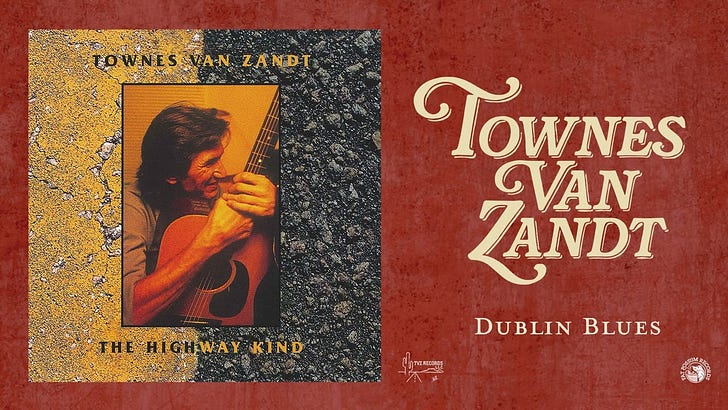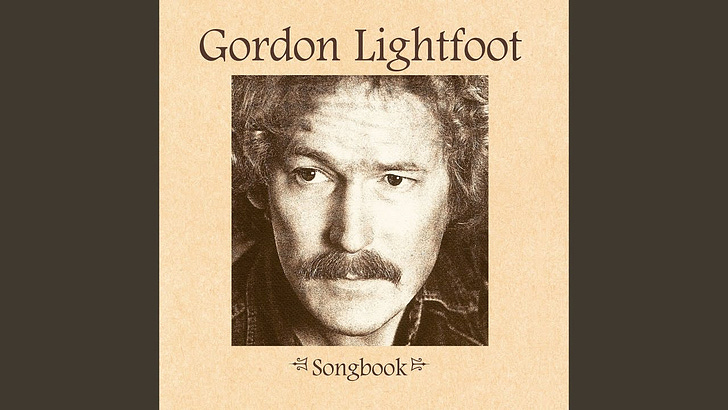I was thinking about the great Guy Clark song, “Dublin Blues” and, particularly, a Townes Van Zandt cover, and posting about it try to figure out how much of my reaction is explained by the performance itself, and how much I am influenced by having found it at the right moment.
As that suggests, I encountered this at a formative point. Listening to it now, the entire song feels simply correct — because the standard I am measuring it against is itself. But, hopefully, I can convince some of you that it’s a superb performance.
So forgive me all my anger, forgive me all my faults
There's no need to forgive me for thinkin' what I thought
I loved you from the git go and I'll love you till I die
I loved you on the Spanish steps, the day you said goodbye
I have been to Fort Worth, hmm, and I have been to Spain
And I have been too proud to come in out of the rain
And I have seen the David, hmm, I've seen Mona Lisa too
And I have heard Doc Watson play Columbus Stockade Blues
The emotional core of the songs is a mixture of pain (the narrator describes himself in the first verse as, “Holding back and choking back the shakes with every breath”) and an assertion of human dignity. The first thing that’s striking about the lyrics quoted above is the way it puts American folk art on the same level as European high art — suggesting that Doc Watson is artistically comparable to the David or the Mona Lisa. But it also puts his own experience on equal weight with the art. The important thing about the Spanish Steps1 is that she said goodbye. He has seen the David and he’s been proud and hurt and that is all part of his life.
Townes Van Zandt makes those emotions feel deeply real. There is something remarkable about how he’s able to deemphasize the structure of the song — the rhymes, the chorus, and make each line feel, simply, like what he needs to say at that moment. Even a line like “Now I am just a poor boy, work's my middle name” which risks being cliché feels fully fresh (and the concluding line of that verse is just heartbreaking, “I'll walk away from trouble, but I can't walk away from you”)
It makes me think about
’s posts on acting and realism. For example”Myth: you can’t be ‘artificial’ and also ‘authentic.’ Of course any trained actor will tell you that of course you can be both—that’s what good acting is. This myth also means that artists who don’t know any better will eschew editing/revising/rehearsing, because to do those things is to take away the authenticity or heart of the art. It doesn’t actually do this, obviously; [eradicating revision] just makes for bad technique and therefore bad art. I’ve written about this concept a few times before, notably in ‘Actually, Don’t’ and ‘Discipline.’”
I am unable to judge what in Townes’ performance is craft and what is genuine feeling2, but I know that I completely trust the emotion that he expresses, and that’s tough to pull off.
For comparison here is Guy Glark.
It’s an excellent song and, for me, not as visceral.
Steve Earle also has a good cover (and I should listen to the rest of that album, which looks excellent).
I went years before learning that the Spanish Steps are in Rome: https://en.wikipedia.org/wiki/Spanish_Steps
Townes Van Zandt is often cast as a familiar figure — one whose emotional turbulence is inseparable from his art, and I’m sure that’s partially correct, but he’s clearly also attentive to craft.
Subscribe to Earnestness Is Underrated
I keep getting into conversations on substack, and want a place to store longer thoughts.














Thanks for writing about this song, and especially Townes' cover, which I know but play less often than Guy's versions (mainly because I have Dublin Blues and some live Guy albums as staples on my car stereo, but not that particular Townes album).
I love Guy's 'original' from the studio album, but you're right to pick up on the qualities that come through Townes' rendition. What I hear in this is a curiosity Townes brings to many of his later performances, whether of his own songs or those of others, an interrogation of the lyric that suggests simultaneously that it’s a fascinating object he’s just encountered and that it’s an articulation of his lived experience. I don’t know how he pulls off that contradiction, but he does.
As for the craft aspect, I have pages of notes about this just based on things that Townes and Guy have said or that have been said about them. I happen to find the 'art vs craft' aspect of songwriting fascinating and those two artists seem to elicit a lot of reflections on the topic. According to Tamara Saviano's biography of Guy Clark, he often resented the 'craft' tag that was applied to him, possibly because he identified as a poet and the 'poet' tag was more often given to Townes. Then again, Townes' son JT has spoken about the work his father put into crafting his songs, and Townes spoke about it too, though he made a distinction between the songs that he 'found' in the air and those he worked harder at based on his literary studies. I wish there were more written on this topic; most writing on Townes (and a fair amount on Guy) would rather chase the 'crazy' hard-livin' stories instead of talking about the art and craft of songwriting.